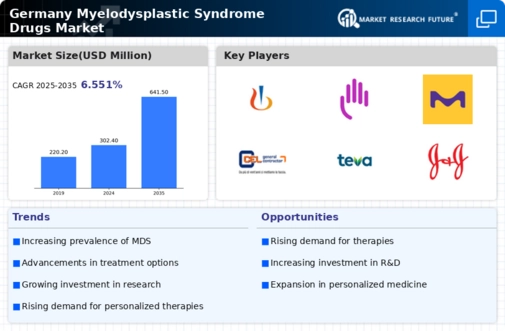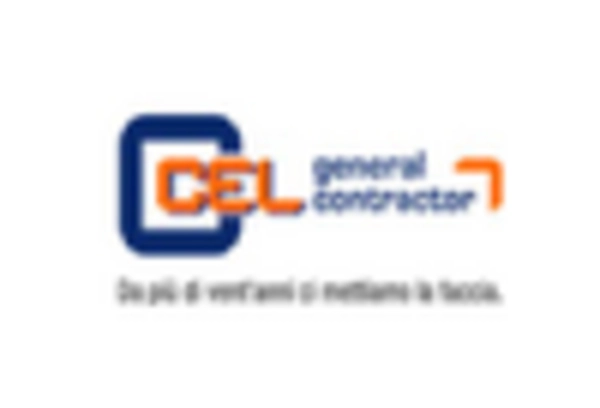Rising Healthcare Expenditure
The increasing healthcare expenditure in Germany is a significant driver for the myelodysplastic syndrome-drugs market. With healthcare spending projected to reach approximately €500 billion by 2025, there is a growing emphasis on investing in innovative treatments for chronic diseases, including MDS. This financial commitment from both public and private sectors facilitates research and development efforts, enabling pharmaceutical companies to bring new therapies to market. Additionally, the German healthcare system's focus on improving patient outcomes encourages the adoption of advanced treatment options. As healthcare budgets expand, the allocation of funds towards hematological disorders is likely to increase, thereby supporting the growth of the myelodysplastic syndrome-drugs market. This trend indicates a positive outlook for the availability and accessibility of MDS treatments in the near future.
Advancements in Drug Development
Technological advancements in drug development are significantly influencing the myelodysplastic syndrome-drugs market. Innovations in biotechnology and pharmacogenomics have led to the creation of more targeted therapies, which are tailored to the genetic profiles of patients. This shift towards personalized medicine is particularly relevant in the context of MDS, where treatment responses can vary widely among individuals. The introduction of novel agents, such as hypomethylating agents and immunotherapies, has shown promising results in clinical trials, enhancing the therapeutic landscape for MDS patients. In Germany, the approval of new drugs has been expedited by regulatory bodies, reflecting a commitment to improving treatment options. As these advancements continue, they are likely to drive market growth by providing healthcare professionals with more effective tools to manage MDS.
Enhanced Awareness and Education
Enhanced awareness and education regarding myelodysplastic syndromes are pivotal in driving the myelodysplastic syndrome-drugs market. Increased efforts by healthcare organizations and patient advocacy groups in Germany have led to greater recognition of MDS among both healthcare professionals and the general public. Educational campaigns aim to inform about the symptoms, diagnosis, and treatment options available for MDS, which may lead to earlier detection and intervention. As awareness grows, more patients are likely to seek medical advice, resulting in higher diagnosis rates and, consequently, an increased demand for effective therapies. This heightened awareness not only benefits patients but also encourages healthcare providers to stay updated on the latest treatment modalities, further propelling the myelodysplastic syndrome-drugs market.
Regulatory Incentives for Drug Approval
Regulatory incentives for drug approval play a crucial role in shaping the myelodysplastic syndrome-drugs market. In Germany, regulatory bodies have implemented various initiatives to streamline the approval process for new therapies, particularly those targeting rare diseases like MDS. These incentives may include expedited review processes, reduced fees, and market exclusivity for innovative treatments. Such measures encourage pharmaceutical companies to invest in research and development for MDS drugs, as they can expect a more favorable regulatory environment. The potential for quicker access to the market not only benefits manufacturers but also enhances patient access to novel therapies. As a result, these regulatory incentives are likely to stimulate growth in the myelodysplastic syndrome-drugs market, fostering innovation and improving treatment options for patients.
Increasing Incidence of Myelodysplastic Syndromes
The rising incidence of myelodysplastic syndromes (MDS) in Germany is a crucial driver for the myelodysplastic syndrome-drugs market. Recent data indicates that the prevalence of MDS has been steadily increasing, with estimates suggesting that approximately 4.5 cases per 100,000 individuals are diagnosed annually. This growing patient population necessitates the development and availability of effective therapeutic options, thereby stimulating market growth. As healthcare providers seek to address the needs of these patients, the demand for innovative drugs is likely to rise. Furthermore, the aging population in Germany, which is more susceptible to hematological disorders, contributes to the increasing incidence of MDS. Consequently, this demographic shift is expected to further bolster the myelodysplastic syndrome-drugs market in the coming years.
















